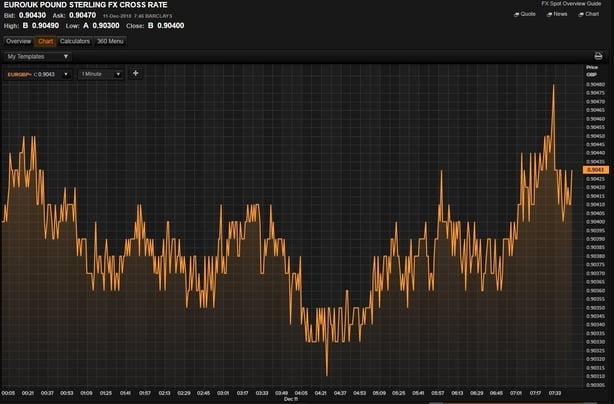The British pound is languishing near 20-month lows against the dollar this morning after British Prime Minister Theresa May postponed a crucial vote on her Brexit deal, raising the risk of a chaotic exit from the European Union.
Mrs May yesterday postponed a parliamentary vote on her Brexit deal to seek more concessions.
The move stoked more uncertainty as Britain now faces Brexit without a deal, a last-minute agreement or another EU referendum.
The euro was trading at £0.9043 shortly after 4pm, up slightly against sterling on the day.

Although the euro rose against the struggling pound yesterday, concerns over violent protests in France against President Emmanuel Macron's economic reform limited its gains.
Meanwhile, sterling was down 0.3% to $1.2524 after slumping 1.3% the previous day, when the currency brushed $1.2507, its lowest since April 2017.
The pound's slide was a boon for the dollar, which rallied back from a 2-1/2-week low against a basket of currencies initially driven by a growing view the Federal Reserve could pause its rate hike cycle sooner than previously thought.
The dollar index, a measure of the greenback's strength versus a group of six major peers, was a touch lower at 97.092 after rallying 0.75% yesterday.
At one stage in overnight trade it had fallen to 96.364, its lowest since 22 November.
"Falling US yields will eventually nudge the dollar into a downtrend, but probably not at this moment," said Junichi Ishikawa, senior FX strategist at IG Securities in Tokyo.
"There just isn't enough demand for the yen, which is less of a safe haven, and the euro, with the political concerns in Europe. And there is of course the pound which is burdened with Brexit problems."
The 10-year Treasury note yield has dropped to a three-month low this week, with dovish comments from Fed officials and soft US data further sharpening views on an imminent pause in the tightening cycle.
The euro nudged up to $1.1365 after shedding 0.2% yesterday.

